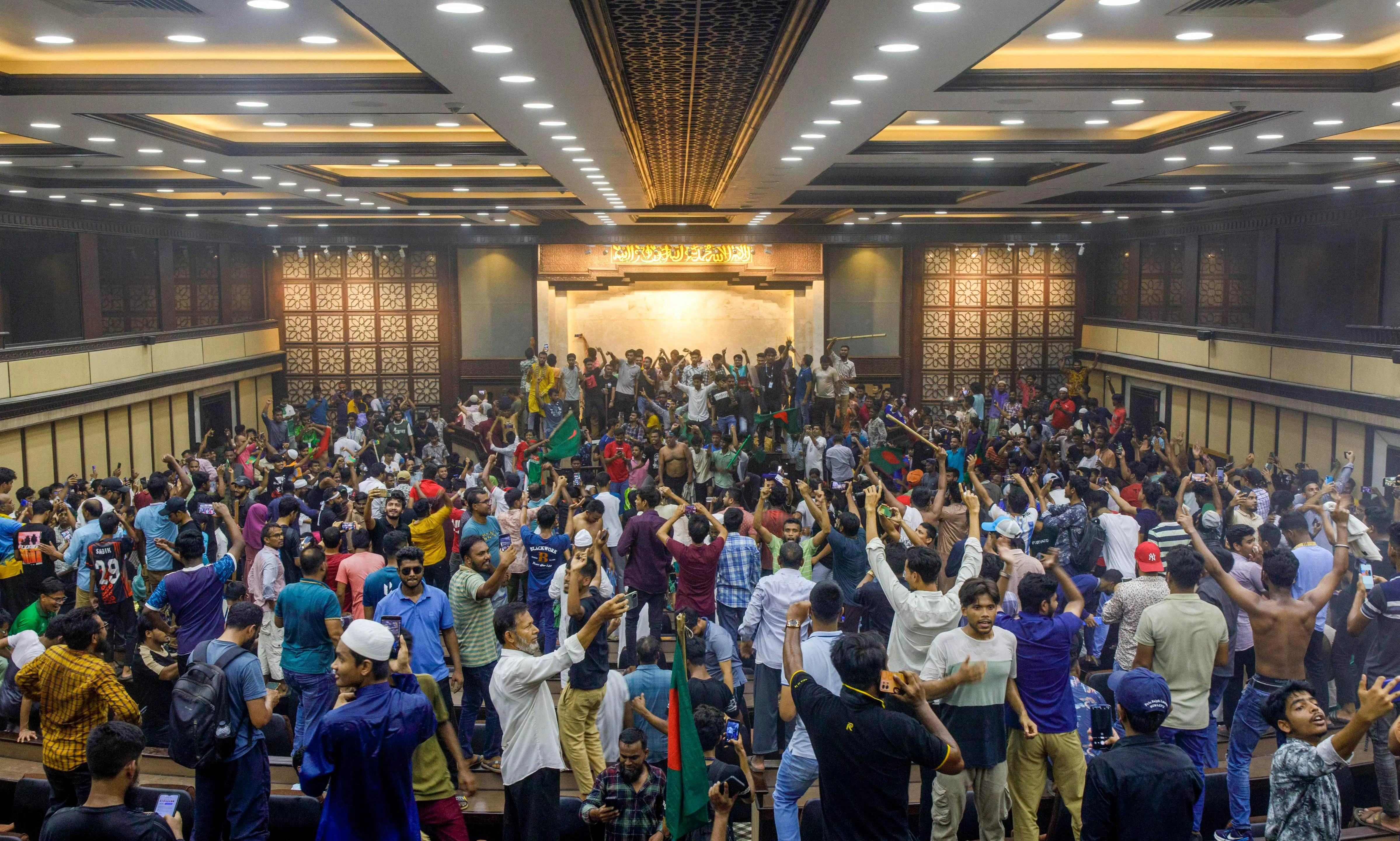
Day after Sheikh Hasina flees, uneasy calm in Bangladesh
Hundreds of people broke into Hasina's palace, her office, and the parliament building and took away whatever they could get their hands on

Bangladesh is experiencing an uneasy calm after the ouster of Awami League’s all-powerful Prime Minister Sheikh Hasina on Monday.
Almost all the shops and offices remained open through Tuesday, and people went about their daily business as if nothing had happened.
Parliament was dissolved during the day with the expectation that an interim government will soon take over. The streets of Dhaka are gradually seeming normal with its thronging crowds.
Students take charge
Long-haul transport and intra-city buses are back on the roads. With traffic police absent on the streets ordinary people and students are controlling traffic in many places along with troops.
Photographer Shahidul Alam posted a photo of vehicles in line near Dhaka’s Bijoy Sarani. “The last time I saw traffic as organised like this was in 2018. Again, it was the students who organised it. Emergency lane for ambulances,” he wrote.
Mobs break into offices
Hundreds of people broke into the prime minister’s palace, her office, and the parliament building and took away whatever they could get their hands on. They vandalised statues and murals of Sheikh Hasina’s father Sheikh Mujibur Rahman, Bangladesh’s founding father.
The attackers burned the Bangabandhu museum in Dhanmondi, destroying a part of the historical structure.
The offices of Awami League and its frontal organisations, as well as the residences of the party’s leaders and its once-powerful ministers, were ransacked and, in many places, set on fire.
On Monday, 13 police stations in Dhaka and seven outside the capital were attacked, looted, and burnt. Two jails in Satkhira and Sherpur were attacked. In Jashore, a residential hotel owned by an Awami League leader was vandalised and set afire from a victory procession, killing 21 people, including a foreigner.
Attacks on minorities
More than 200 people, including the general public, were killed in violence on Sunday and Monday, according to local media reports. Opposition mobs went after Awami League leaders and some targeted minorities.
On Monday evening, Natore Puja Celebration Committee president Dwipendranath Saha was at home when a group of stick-wielding men arrived. They attacked the Kali temple and smashed security cameras. Then they attacked Saha’s residence, adjacent to the temple, and looted it. Saha contacted the police, but was told that no help would come.
Similar attacks took place on at least five other houses in Natore. Videos of people vandalising statues also surfaced on social media, but so did photos of Muslims guarding temples.
The Bangladesh Hindu Buddhist Christian Unity Council said at least nine temples were attacked in four districts. Attacks on houses and businesses of Hindus were reported in at least 29 districts.
The Centre for Police Dialogue’s fellow Debapriya Bhattacharya said the resignation of Sheikh Hasina triggered "euphoria" among the opposition.
Call for restraint
The University Teachers’ Network at Dhaka University claimed that no attempt was being made to protect religious minorities.
Meanwhile, two coordinators of the students’ protest, Sarjis Alam and Hasnat Abdullah, have called for restraint and urged the people to refrain from communal attacks.
In an all-party meeting in Delhi, the Indian government told the various leaders that the safety of minorities in Bangladesh was a priority and measures were being taken to protect them.
EU ambassador to Bangladesh, Charles Whiteley, wrote on X that EU heads of mission “are very concerned about incoming reports of multiple attacks against places of worship and members of religious, ethnic and other minorities in Bangladesh”.
“We urgently appeal to all parties to exercise restraint, reject communal violence and uphold the human rights of all Bangladeshis,” he added.
“Second liberation”
A day after Hasina fled, students opposed to the ex-prime minister took out victory processions and rallies terming the end of the Awami League dispensation as the “second liberation”.

